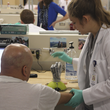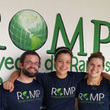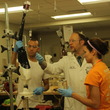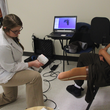Program Phases
The Orthotics and Prosthetics Program at Baylor College of Medicine is divided into two phases.
12 Month Didactic
Combines evidence-based coursework and training in our state-of-the-art fabrication lab while interfacing with patients.
| Year 1, Fall 1 | Year 1, Spring 1 |
|---|---|
| Anatomical Sciences for O&P | Health Research Methods |
| Cultural Competency for O&P | Technical and Safety Skills II |
| Health Behavioral Counseling | Biomechanics II |
| Biomechanics I | Physical Examination II |
| Technical and Safety Skills I | Lower Limb Orthotic Management II |
| Physical Examination I | Lower Limb Prosthetic Management II |
| Lower Limb Orthotic Management I | Spinal & Cranial Orthotic Management |
| Lower Limb Prosthetic Management I | Upper Limb Prosthetic Management |
| Upper Limb Orthotic Management | Transition to Practice |
| Pathophysiology for O&P | |
| Clinical Practice Management I | |
| Pedorthic Management | |
18 Month Clinical Residency
Consists of four-six local and national clinical rotations, curated by faculty with students. We have a growing network of over 100 carefully vetted clinical sites to provide the most diverse and highest quality experiences in orthotic and prosthetic patient care. Coursework is taken in parallel to support continued learning and transition from training to clinical practice. Upon completion of the didactic and clinical curriculum, graduates are eligible to sit for the National ABC Board Exams in both Orthotic and Prosthetic Disciplines.
| Year 2, Fall 2 | Year 2, Spring 2 | Year 3, Fall 3 |
|---|---|---|
| O&P Research I | O&P Research II | O&P Research III |
| Clinical Rotation I | Clinical Rotation III | Clinical Rotation IV |
| Clinical Seminar I | Clinical Seminar III | Clinical Seminar IV |
| Clinical Rotation II | Clinical Rotation V | |
| Clinical Seminar II | Clinical Seminar V |
Total timeline for Baylor path to board eligibility - 30 months
12 months didactic, 18 months integrated residency
M.S. Degree, Board Eligible Orthotics & Prosthetics
Total timelines for traditional path to board eligibility are 36 to 48 or more months.
18-24 months for MPO or M.S. degree.
Prosthetics residency, 9-12 months.
Orthotics residency, 9-12 months.
Program Highlights

As a Master of Science program at one of the nation’s largest biomedical research institutions, innovation and research are heavily emphasized throughout the curriculum. Students conduct research with the goal of driving growth and innovation within the profession.

Service to the community is fostered through participation in local and global opportunities to care for the underserved. Through Baylor Global Initiatives and established relationships with hospitals and clinics throughout the world, the institution connects students with service opportunities that suit their goals.

We provide an environment conducive to the intellectual and professional development of the attributes essential to the healthcare practice. View the qualities felt to reflect the highest ideals of healthcare practice and ethical behavior for students in our program.

Leadership and professional development are paramount for Baylor students, residents, and alumni. Training, as well as opportunities for leadership, are continually provided at the state and national level through direct involvement in affiliated orthotic and prosthetic professional organizations and societies.
"Diversity obviously includes acceptance of differences in race, gender, religion, etc. But more than that, it means you really try to understand and relate to people and to work to understand why each person believes and acts the way they do. I grew up in a sheltered, small town. Having classes and interactions with people from so many different backgrounds has helped me grow both personally and professionally."
Program Application
Ready to begin your journey to becoming an orthotist or prosthetist? Learn about our admissions process and get started today!
Student Handbook
Review the School of Health Professions Student Handbook for important academic policies, procedures, guidelines and more.








